A HUSBAND and wife whose lives were turned upside down when he suffered a stroke - which led to a battle against aphasia - have shared their story in the hope of helping others.
Frank Senior, from Darfield, was diagnosed with the disorder - which affects a person’s ability to speak, read, write and understand language - following a stroke in 2011.
He and his wife, Lyn, chose to speak about Frank’s inspiring journey to recovery and their important call to action during Aphasia Awareness Month.
For Frank, 2010 was the start of a devastating series of events - that year he was made redundant and not long after, his mum passed away.
These life-changing events happened so close together and the natural build-up of emotions made Frank very aware of his mental health.
Suddenly in January 2011, he suffered a stroke and was left unable to walk or talk at the age of 56.
Lyn said: “It heartbreaking - his eyes were open but there was nobody there and life as we knew it changed overnight.
“Following a five-month stay in hospital, the consultant recommended that Frank should reside in a care home as he would never walk or talk again.
“I felt like I was the only one fighting for him, so I took him home and continue to do everything I can to care for him.
“Soon after Frank lost his independence, he noticed people were treating him differently.
“Whilst he wasn’t able to walk or talk, he hadn’t lost his comprehension.
“His GP was outstanding, but the hospital visits were very different.
“As nobody could understand Frank, the practitioners often didn’t even acknowledge his presence in the room.
“One time, I remember Frank being sat right next to me, but because he couldn’t speak for himself, the staff ignored him and only wanted to talk to me.
“It had a huge impact on him because he was listening to - and could understand - everything that was being said.
“Because they didn’t involve him in the conversation, he ended up in tears.”
In the midst of Frank’s recovery, the family received some more devastating news as in April 2015, Frank’s son passed away, before his sister died just a year later.
He says that dealing with the death of his own son, sister and mother contributed to his ill health and ultimately his stroke.
Tech-savvy Frank spent hours learning how to build his very own communication aid, which reads aloud to help him join in conversations and communicate topics of interest.
After just a few years, he learnt how to drive an adapted car and quickly got back on the road, gaining back his independence.
Nowadays, Frank can say the odd word - he’s learnt how to gesture, and how to communicate by drawing or writing using a pen and paper.
Lyn added: “More often than not, his trusted computer is by his side.
“Nevertheless, you can see the frustration when he’s trying so hard, but just can’t communicate what he wants to say, and you can see the joy on his face when someone has the time, patience and intuition to help understand and articulate.
“A few years ago, a close friend referred Frank to a Barnsley Aphasia Cafe ran by Yorkshire-based charity, Aphasia Support.
“The group meets twice a month at Barnsley Metrodome and welcomes local people with aphasia, as well as their carers.
“For the awareness month, Frank would like to emphasise how important it is to recognise the impact both life, and life with aphasia, can have on a person’s mental health and the limited support available.
“The current NHS pathway of support varies depending on where you live as each district offers a different service, and when that timeline ends, professionals refer to charities like Aphasia Support.
“A call to action is needed to ensure people with aphasia and their carers are prioritised, not forgotten.
“Life has improved over the past 12 years and we cherish weekends soaking up the sea breeze on the coast, and time spent with family and friends.
“But we never know what lies ahead - the weight of aphasia comes in waves, and the emotions are often hard to overcome.
“It takes strength and resilience, and it’s helped by being met with compassion.
“If you ever meet someone who struggles to speak, read, write or understand language, please don’t cut them off, get frustrated or presume you know what they want to say.
“Simply offer a listening ear, be patient and give them the time and support they need.”



























